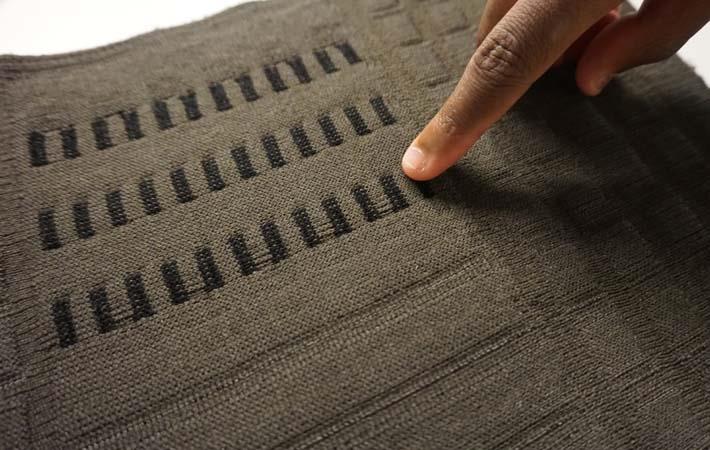Drexel University, in partnership with Department of Defence-supported Advanced Functional Fabrics of America (AFFOA), is setting up a statewide centre that will help companies, entrepreneurs and innovators take their advanced-textile concepts from prototype to product and prepare America’s workforce for the quality jobs the sector is generating.
Called the “Pennsylvania Fabric Discovery Centre,” this statewide resource is the first hub located outside of AFFOA’s home state of Massachusetts. It will be part of a national network intended to lower the barrier to commercialisation for functional fabrics, resulting in advanced textiles that do things like see, hear, sense, communicate, generate and store energy.Drexel University, in partnership with Department of Defence-supported Advanced Functional Fabrics of America (AFFOA), is setting up a statewide centre that will help companies, entrepreneurs and innovators take their advanced-textile concepts from prototype to product and prepare America's workforce for the quality jobs the sector is generating.#
“The Fabric Discovery Centre will build upon Pennsylvania’s rich textile history and bring together academic and industrial expertise statewide to create an ecosystem that supports innovation, collaboration and education,” said Genevieve Dion, an associate professor in Westphal College of Media Arts & Design, founder of the Shima Seiki Haute Tech Lab at ExCITe and director of Drexel’s Centre For Functional Fabrics. “The Pennsylvania Fabric Discovery Centre will help promote the growth of advanced manufacturing in the region.”
As part of the Advanced Functional Fabrics of America strategy, Fabric Discovery Centres will open across the country to stimulate economic growth in the functional fabrics sector. Similar centres are now in place in Massachusetts: the AFFOA Fabric Discovery Centre Headquarters, in Cambridge, Massachusetts; the Defence Fabric Discovery Centre at Massachusetts Institute of Technology’s Lincoln Lab; and the University of Massachusetts Lowell Fabric Discovery Centre, which will open in early 2018.
Pennsylvania’s Fabric Discovery Centre will have a physical home at Drexel’s innovation-driven economic development venture with Brandywine Realty Trust, called Schuylkill Yards, in 2018. It will provide an end-to-end advanced manufacturing facility capable of developing functional fabric prototypes for pilot-stage production. It will also bring together research and expertise from universities across the state that are also members of AFFOA, including Carnegie Mellon, Penn State University and Jefferson University.
The Centre will work closely with industry partners and regional organisations that foster innovation and economic growth such as Ben Franklin Technology Partners, Pennsylvania Department of Community and Economic Development and the Manufacturing Extension Partnerships in Pennsylvania, including Delaware Valley Industrial Resource Centre. These partnerships will accelerate the development of new products and manufacturing processes by established companies, startups and entrepreneurs in the functional fabric space. Workforce training and startup incubation are important elements of the Centre’s mission.
“Advanced fabric manufacturing is undergoing a supply chain renaissance,” said Drexel President John Fry. “Industry verticals, such as information and communications technology, digital health and transportation that were never previously textile-related now have the opportunity to connect in new and meaningful ways. Pennsylvania can become a leader in this next generation cluster by ensuring the adoption of targeted initiatives that will enhance regional competitiveness.”
One of the first projects to be developed at Drexel as part of the Fabric Discovery Centre is a functional fabric touch sensor. The fabric touch sensor is like a textile version of the touch pad on a smartphone that uses fluctuations in its electric field, call capacitance, to detect position, pressure and movement of touch. The “Capacitive Touch Sensor and Interface” is an AFFOA-funded collaboration between Drexel’s Centre For Functional Fabrics and Apex Mills, a textile manufacturing partner from Inwood, New York. The sensor will be produced as a maker kit, like the Lilypad Arduino, at the Pennsylvania Fabric Discovery Centre and Apex Mills will develop the manufacturing methods to integrate and mass-produce the fabric sensor for other markets and applications.
The Massachusetts-based Fabric Discovery Headquarters, opened in June 2017, has already unveiled two advanced fabric product platforms. This summer, AFFOA launched the world’s first digitally connected, programmable backpack and a fabric light-based communications system dubbed “Fabric LiFi.” Both product platforms, developed through AFFOA’s industry partners and prototyping network, are enabled by advanced fabrics made in America. The Fabric Discovery Centre programme along with exciting product platforms exemplifies the future where US manufacturing innovations enable breakthrough products that benefit consumers and offer service-based business models.
“President Fry’s vision and leadership have been a cornerstone of AFFOA’s success from its conception. It is only fitting that Drexel University and the State of Pennsylvania would be at the forefront of establishing the first Fabric Discovery Centre outside of Massachusetts,” said Yoel Fink, CEO of AFFOA. “The Pennsylvania Fabric Discovery centre is an important milestone for all of us in our mission to accelerate startups, develop the workforce of the future and enable advanced fabric prototyping facilities. We are excited to work collaboratively with Drexel, local manufacturers, educational institutions and the State of Pennsylvania to facilitate the creation of this centre.” (SV)
Fibre2Fashion News Desk – India


